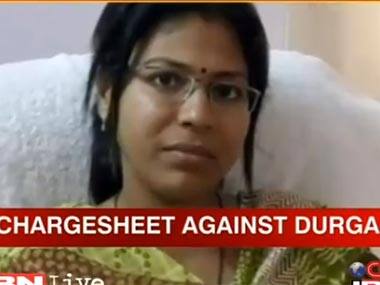On Thursday, Akhilesh Yadav defended his government’s decision to suspend IAS officer Durga Shakti Nagpal and said there would be no reconsideration of the decision. Speaking after a cabinet meeting in Lucknow, Yadav said that the government was under no pressure from any particular lobby to suspend the officer and added that her suspension was not related to illegal sand mining. But Akhilesh’s claims that he was only maintaining law and order by transferring Nagpal after she ordered the demolition of an illegal mosque wall have been continually eroded over the past few weeks. As Firstpost editor Sanjay Singh pointed out in this editorial : “Akhilesh Yadav has chosen to go on the offensive, championing the cause of the mosque, secularism and “communal harmony” instead of admitting that he had acted on the basis of a motivated piece of advice from a self-indulgent party leader…the BSP is trying hard to show that the Samajwadi Party is “misguiding Muslims” about the mosque, when the actual issue was protection of the sand mafia.” [caption id=“attachment_1008997” align=“alignleft” width=“380”]  Durga Nagpal. Image courtesy IBNLive[/caption] Yadav’s supposed pre-emptive strike against communal violence was again negated with an editorial in today’s DNA by television journalist Sunetra Choudhury, who pointed out that riots have taken place in the state in the past, but action has never been as prompt as it was in the case of Nagpal. “While it is indeed reassuring to see any government act in anticipation of a situation, in this case that logic just doesn’t wash because the state has seen multiple riots in the last 18 months on Yadav Jr’s rule,” says Choudhury. “But it took the government four days to transfer the civil administration in Bareilly after riots last year.” This claim of inaction on the part of the government when it came to earlier riots was reiterated by LK Bajpai, the state president BJP. “The government is giving a lame excuse for Nagpal’s suspension. The reality is that the government is trying to save the mafia and it had been waiting for some excuse to shift the officer from the site,” said Bajpai. “If maintaining communal harmony is the reason for the suspension then why has the government not suspended all those senior officials who failed to check the series of riots that has taken place in the state since the SP government came to power?" Alka Pande, writing for _Firstpost_ , points out that not many in the state are willing to buy Yadav’s reasoning anyway. “Reports from various quarters confirm that the suspension was the result of her aggressive approach to curb the sand mafia active in the western UP,” writes Pande. Meanwhile, Yadav is still getting brickbats for failing to contain the sectarian violence breaking out in Lucknow. Bharatiya Janata Party (BJP) state spokesman Vijay Bahadur Pathak charged Yadav with ‘double standards,’ pointing out that IAS official Durga Shakti Nagpal was suspended on the assumption that communal harmony might be disturbed while no action is being taken against officials in places where actually violence and riots are taking place, according to a report in IANS. An article in NitiCentral also took aim at Yadav’s ‘convenient secularism’ today. As the report says: “On July 27, two people including a woman were killed and over a dozen were injured in communal clashes in a village in Meerut.” The small report was passed over, as stories of communal disharmony are so common in Uttar Pradesh. “Akhilesh Yadav’s Government has rarely taken any disciplinary action on any of his officers over the scores of communal clashes that have happened under his watch. So this anticipatory action would have been welcome had it been to prevent riots,” says the report in NitiCentral. But as is becoming abundantly clear, it wasn’t. There was little to suggest that locals were upset with the wall’s demolition, and Nagpal was just a political sacrifice for the UP government.
When riots have taken place in the state in the past, and even now sectarian violence rages on in Lucknow, what made the case of Durga Nagpal so urgent?
Advertisement
End of Article


)
)
)
)
)
)
)
)
)



